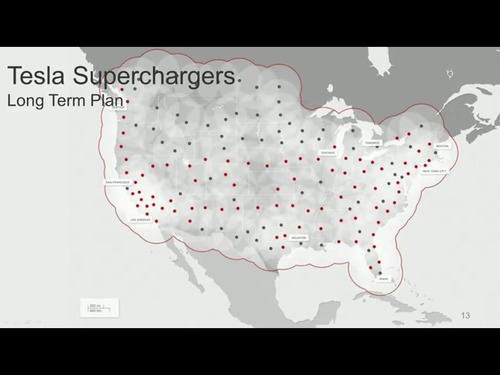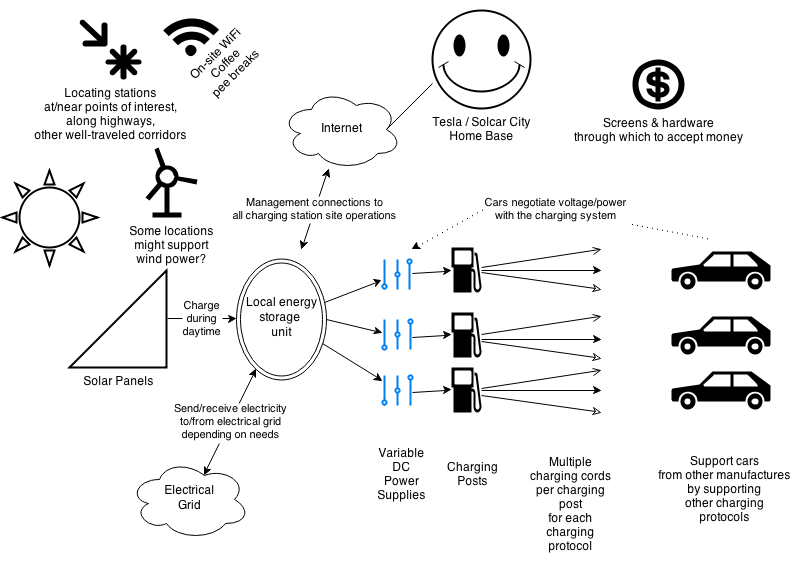Tesla Motors has opened their patent portfolio, hoping to encourage other automakers to use that technology to speed up electric vehicle development. At the same time we’ve learned BMW, Nissan and Tesla Motors are talking about collaboration around Tesla’s Supercharger system, despite a history of in-fighting between automakers on fast charging standards. The evolving situation entices us with thoughts that in the not-too-distant future the automakers will agree on a common fast charging platform. It’s time to ponder a thought that’s been in the back of my head – does Tesla Motors need to spin the Supercharger network out as a separate company?
Tesla’s long-term plan for the Supercharger network is impressive. Coupled with the Model S/X long driving range, and the spread of the Supercharger stations, Model S/X owners should be able to travel freely around the U.S., Europe, China, and elsewhere.
But we should all have some concern about this, because Tesla Motors is taking control over functions that are traditionally owned and operated by third parties. I’ve asked this before – While Tesla Motors is currently acting honorably and earning lots of trust and goodwill (I know I’m very excited about Tesla) will Tesla ever turn evil? Will Tesla’s proprietary control over refueling and service of Tesla’s cars prove too much a temptation to do something evil?
Concerning the Supercharger network, I doubt the other automakers would support it as a Tesla-owned service in which they’d send their customers to Tesla for fuel. What’s BMW’s or Nissan’s incentive to build up Tesla’s prestige in the world?
Therefore, does the Supercharger network need to be spun out as a separate company?
As a separate company the Supercharger network would be able to serve multiple automakers, and their customers, more equally than if the Supercharger network were owned by Tesla.
Of course there are already several 3rd party companies offering electric car charging services. Having several automakers launch a joint venture company offering electric car charging would threaten the incumbent charging network operators (ChargePoint et al).
A month ago I asked this question in a different way. At that time I thought about an “electric station” incorporating solar panels, a grid-connected electric storage system, and fast charging services. There’s nothing unique about this idea – others are thinking about this as well. The “electric station” concept is close to what Tesla plans for the Supercharger stations. According to a Der Spiegel article published a few days ago![]() , the Germans are planning “charge lounges” that are similar.
, the Germans are planning “charge lounges” that are similar.
This model makes so much sense. Ask the car owner to spend 30 minutes recharging their car, and offer them some snacks or WiFi access at a fee. With enough traffic these stations, whatever you call them, could earn a decent revenue stream selling coffee and snacks. And having co-located renewable energy (solar panels) would speak a great message, even if it’s unfeasible to install enough solar panels at each location to provide enough power.
This kind of station would be extremely more valuable if the fast charging was available as a common platform, rather than the hodgepodge of incompatible standards we have today. Why? It’s known as the Network Effect. That’s a technology theorem saying that the value of a service is higher the more connected it is.
The Network Effect is usually used to explain why the Internet is so freakin’ valuable to human society, but it also applies to electric car charging services. The current situation – CHAdeMO, CCS and Supercharger fragmenting the fast charging market – is not terribly useful to electric car owners, and is therefore not very valuable. The CHAdeMO network’s value is limited by the spread of the Nissan Leaf – and likewise for CCS and Supercharger. But join them together into a common fast charging standard, and it immediately becomes way more useful to car owners, more likely to be used by them, and therefore more valuable.
How likely are the other automakers to support Tesla in offering this service? Again, I think it unlikely for the reasons already stated.
Elon Musk is implying that Tesla might well have to hand over the Supercharger technology, to somehow jointly develop it between automakers, and perhaps have 3rd parties installing Supercharger stations. “We’re
more than happy to have other manufacturers use our Supercharger
network, or to build Superchargers and install them, and then maybe have
some sort of cross-use agreement.”
Is joint ownership of the Supercharger system the direction being taken? Or have I strayed out on a limb that’s about to break?
- Highway design could decrease death and injury risk, if “we” chose smarter designs - March 28, 2015
- GM really did trademark “range anxiety”, only later to abandon that mark - March 25, 2015
- US Government releases new regulations on hydraulic fracturing, that some call “toothless” - March 20, 2015
- Tesla Motors magic pill to solve range anxiety doesn’t quite instill range confidence - March 19, 2015
- Update on Galena IL oil train – 21 cars involved, which were the supposedly safer CP1232 design - March 7, 2015
- Another oil bomb train – why are they shipping crude oil by train? – Symptoms of fossil fuel addiction - March 6, 2015
- Chevron relinquishes fracking in Romania, as part of broader pull-out from Eastern European fracking operations - February 22, 2015
- Answer anti- electric car articles with truth and pride – truth outshines all distortions - February 19, 2015
- Apple taking big risk on developing a car? Please, Apple, don’t go there! - February 16, 2015
- Toyota, Nissan, Honda working on Japanese fuel cell infrastructure for Japanese government - February 12, 2015












